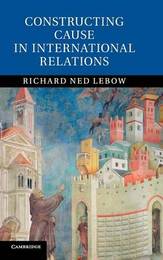
|
Constructing Cause in International Relations
Hardback
Main Details
| Title |
Constructing Cause in International Relations
|
| Authors and Contributors |
By (author) Richard Ned Lebow
|
| Physical Properties |
| Format:Hardback | | Pages:208 | | Dimensions(mm): Height 229,Width 152 |
|
| Category/Genre | Philosophy |
|---|
| ISBN/Barcode |
9781107047907
|
| Classifications | Dewey:327 |
|---|
| Audience | | Professional & Vocational | |
|---|
| Illustrations |
1 Halftones, unspecified; 3 Line drawings, unspecified
|
|
Publishing Details |
| Publisher |
Cambridge University Press
|
| Imprint |
Cambridge University Press
|
| Publication Date |
20 February 2014 |
| Publication Country |
United Kingdom
|
Description
Cause is a problematic concept in social science, as in all fields of knowledge. We organise information in terms of cause and effect to impose order on the world, but this can impede a more sophisticated understanding. In his latest book, Richard Ned Lebow reviews understandings of cause in physics and philosophy and concludes that no formulation is logically defensible and universal in its coverage. This is because cause is not a feature of the world but a cognitive shorthand we use to make sense of it. In practice, causal inference is always rhetorical and must accordingly be judged on grounds of practicality. Lebow offers a new approach - 'inefficient causation' - that is constructivist in its emphasis on the reasons people have for acting as they do, but turns to other approaches to understand the aggregation of their behaviour. This novel approach builds on general understandings and idiosyncratic features of context.
Author Biography
Richard Ned Lebow is Professor of International Political Theory in the War Studies Department of King's College London and James O. Freedman Presidential Professor Emeritus at Dartmouth College. He is also a Bye-Fellow of Pembroke College, University of Cambridge. In a career spanning six decades he has authored 16 books and more than 200 peer-reviewed articles and book chapters in international relations, comparative politics, political theory, methodology, political psychology, history and classics. Among other books, he is the author of The Politics and Ethics of Identity: In Search of Ourselves (Cambridge, 2012), winner of the Alexander L. George Award of the International Society for Political Psychology for Best Book in the Field, 2013; Why Nations Fight (Cambridge, 2010); A Cultural Theory of International Relations (Cambridge, 2008), which won the 2009 American Political Science Association Jervis and Schroeder Award for the Best Book on International History and Politics as well as the British International Studies Association Susan Strange Book Prize for the Best Book in International Studies; and The Tragic Vision of Politics (Cambridge, 2003), which won the 2005 Alexander L. George Book Award of the International Society for Political Psychology.
Reviews'Ned Lebow's new volume is a truly innovative, horizon-expanding and eye-opening work on 'causation' that draws political inferences from the history of visual art. The originality of the approach will stimulate new thinking about world politics, and the straightforward prose style and rigorous method of argument will raise the level of discourse in IR and meta-theory debates.' Fred Chernoff, Harvey Picker Professor of International Relations, Colgate University, New York 'In Constructing Cause in International Relations, Richard Ned Lebow deepens his inquiry into contingency and determinism of his earlier work on counterfactuals. His approach allows for contingent and contextualized generalisations, even forecasts, and yet steers clear of visions which simply qualify determinism as probability without really touching the underlying problems of either Humean or efficient causality. Written in a lucid and jargon-free manner, Lebow's book is not to be missed by anyone interested in causal mechanisms and interpretivist process-tracing, in fact by anyone who looks for a more solid methodological underpinning of qualitative analysis in general.' Stefano Guzzini, Danish Institute for International Studies and Uppsala Universitet, Sweden
|